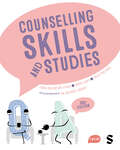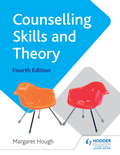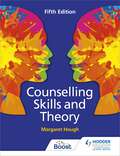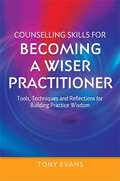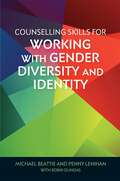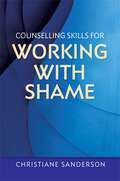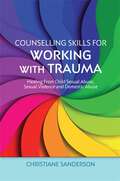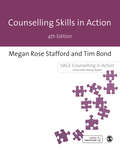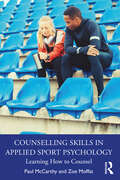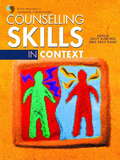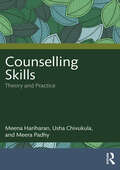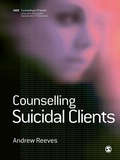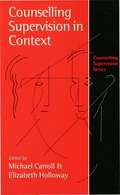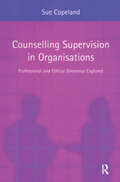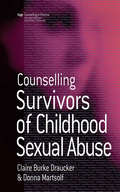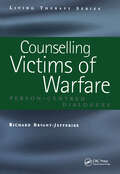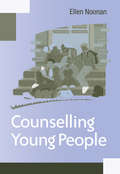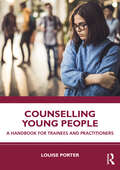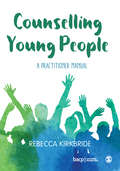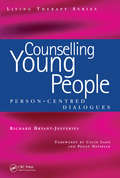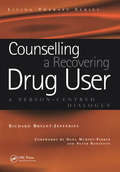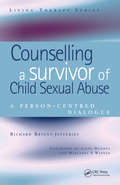- Table View
- List View
Counselling Skills and Studies
by Anthony Crouch Barry Kopp Traci Postings Fiona Ballantine DykesAre you looking to use counselling skills to enhance your existing helping role? Are you taking the first steps towards becoming a professional counsellor? This practical guide will provide you with the ideal introduction, showing you what helping and counselling is all about. Part 1: Counselling Skills will introduce readers to the underpinning knowledge and practical tools needed to develop a range of helping skills for use in a variety of helping roles, showing what it means to work safely and ethically. Part 2: Counselling Studies will help them take their understanding further by considering in detail important theories and professional issues, preparing them to work as a professional counsellor. Part 3: Counselling Study Skills will offer practical advice and hints and tips to help them make the best start on their counselling portfolio, including journal and essay writing skills, research skills and how to get inspired and overcome blocks to learning. The Third Edition includes new content on counselling skills competencies; working with diverse client groups; online counselling; new case studies, tips and activities. Packed full of practical activities and written in a supportive conversational style, this book is essential reading for anyone wanting to learn counselling skills or embarking on their first stage of training to be a counsellor.
Counselling Skills and Theory 4th Edition
by Margaret HoughTrust this bestselling resource to provide you with the clearest introduction to the major approaches in counselling. Written by expert counsellor and bestselling author Margaret Hough, this textbook provides the clearest overview and introduction to the subject. It covers the major approaches to the field, how they interrelate and how you can put them into practice. Suitable for a wide range of qualifications from Foundation courses to Higher Education, it will help you to understand the nature of counselling, the skills you will need to develop and how to overcome the challenges you might face in this rewarding profession. This new edition, now in full colour, provides up-to-date research on topics such as ethics in counselling and the importance of both supervision and person-centred care in residential and hospital settings. - Navigate your way easily with the book's clear language and structure - Translate theory into practice with realistic case studies, exercises and other useful features - Develop your knowledge with extended coverage of cognitive behavioural therapy, Brief therapy and online counselling - Further your understanding with expanded coverage of working with younger clients, counselling for trauma and disaster and psychodynamic theories
Counselling Skills and Theory 5th Edition
by Margaret Hough Penny TassoniTrusted author Margaret Hough updates this bestselling resource that will provide you with the clearest introduction to the major approaches in counselling. Easy to read, clear and concise, this full colour updated edition will take you from learning to application with a variety of group tasks and case studies to explore and evaluate.- Explore the new extended sections on Cognitive Behaviour Therapy, Neuroscience, and Cultural Diversity and Counselling to highlight new approaches, developments and research.- Consolidate learning with new student exercises - now over 70!- Translate theory into practice with new case studies, including some that will illustrate the problems clients experienced during Covid-19, with special reference to emotional and psychological effects of lockdown- Understand the ways in which neuroscience helps us understand the beneficial effects of counselling and psychotherapy with the regular references throughout the book.
Counselling Skills and Theory 5th Edition
by Margaret Hough Penny TassoniTrusted author Margaret Hough updates this bestselling resource that will provide you with the clearest introduction to the major approaches in counselling. Easy to read, clear and concise, this full colour updated edition will take you from learning to application with a variety of group tasks and case studies to explore and evaluate.- Explore the new extended sections on Cognitive Behaviour Therapy, Neuroscience, and Cultural Diversity and Counselling to highlight new approaches, developments and research.- Consolidate learning with new student exercises - now over 70!- Translate theory into practice with new case studies, including some that will illustrate the problems clients experienced during Covid-19, with special reference to emotional and psychological effects of lockdown- Understand the ways in which neuroscience helps us understand the beneficial effects of counselling and psychotherapy with the regular references throughout the book.
Counselling Skills for Becoming a Wiser Practitioner: Tools, Techniques and Reflections for Building Practice Wisdom
by Tony Evans Christiane SandersonConveying the reality of the counselling room, this book provides helpful tips and techniques to enable practitioners to develop and refine their skills. At the heart of this book is the idea of 'situated action'. By this we mean suspending purely intellectual faculties and exploring a different kind of intelligence - one shaped in the real world - in essence what happens to theory when it meets real life. This book offers thirty four skills to achieve this kind of practice wisdom which contain a mixture of reflection, client stories, quotes and images. This text will translate theory into practice for students and be a source of inspiration and reflection for the experienced practitioner.
Counselling Skills for Working with Gender Diversity and Identity (Essential Skills For Counselling Ser.)
by Christiane Sanderson Michael Beattie Penny Lenihan Robin DundasFor any student or practitioner needing to gain a sound understanding of the complex fields of gender variance, gender identity and gender dysphoria, this book provides the ideal starting point for the knowledge and skills that you need. Emphasising the need for affirmative practice in gender care, it provides an overview of the subject areas and process issues which most commonly arise in counselling, combining theoretical with practical perspectives. It explores the diverse range of identities including masculinity, femininity, non-binary, gender dysphoria, trans and cisgender. It also addresses challenges which many clients experience in their daily lives - in the workplace, when coming out, when transitioning and in intimate relationships. The authors highlight the importance of education and reflection to enable good practice. They feature case studies, vignettes and reflective exercises throughout the text, making it a useful tool for professional development as well as suitable as a text for students.
Counselling Skills for Working with Shame
by Christiane SandersonCounselling Skills for Working with Shame helps professionals to understand and identify shame and to build shame resilience in both the client and themselves. Shame is ubiquitous in counselling where there is an increased vulnerability and risk of exposure to shame. While many clients experience feelings of shame, it is often overlooked in the therapeutic process and as a result can be left untreated. It is particularly pertinent when working with clients who have experienced trauma, domestic or complex abuse, or who struggle with addiction, compulsion and sexual behaviours. Written in an accessible style, this is a hands-on, skills-based guide which helps practitioners to identify what elicits, evokes or triggers shame. It gives a general introduction to the nature of shame in both client and counsellor and how these become entwined in the therapeutic relationship. It focuses on increasing awareness of shame and how to release it in order to build shame resilience. With points for reflection, helpful exercises, top tips, reminders and suggestions for how to work with clients, this is a highly practical guide for counsellors, therapists, mental health practitioners, nurses, social workers, educators, human resources, trainee counsellors and students.
Counselling Skills for Working with Trauma: Healing From Child Sexual Abuse, Sexual Violence and Domestic Abuse
by Christiane SandersonCounselling Skills for Working with Trauma is a practical, introductory guide to counselling survivors of child abuse, neglect, rape, sexual violence, sexual trafficking, religious sexual abuse, and domestic abuse. Written in an accessible style, it provides a comprehensive introduction to complex trauma accompanied by advice on how to create a safe environment in which survivors can learn the skills to restore control over trauma symptoms, to aid healing and post traumatic growth. The book covers all of the key principles including: understanding the role of dissociation in complex trauma; the role of attachment; managing flashbacks, panic attacks, nightmares and dissociation; responding to shame and guilt; managing relationships; and the impact of working with complex trauma. It explores how practitioners can work more effectively with trauma, and offers techniques and skills which can easily be integrated into different therapeutic models. Featuring highlighted top tips, common pitfalls and a range of exercises, this is an essential guide for all professionals working with child and adult survivors of trauma.
Counselling Skills in Action (Counselling in Action series)
by Tim Bond Megan Rose StaffordNow in its 4th edition, this bestselling book introduces you to the core counselling and psychotherapy skills you will need for effective therapeutic practice. With an online resource site featuring over 30 videos, you will be taken step-by-step through the skills and strategies needed at each stage of the therapy process.
Counselling Skills in Action (Counselling in Action series)
by Tim Bond Megan Rose StaffordNow in its 4th edition, this bestselling book introduces you to the core counselling and psychotherapy skills you will need for effective therapeutic practice. With an online resource site featuring over 30 videos, you will be taken step-by-step through the skills and strategies needed at each stage of the therapy process.
Counselling Skills in Applied Sport Psychology: Learning How to Counsel
by Paul McCarthy Zoe MoffatCounselling Skills in Applied Sport Psychology is a new text that provides a ‘how to’ in basic counselling skills for sport psychology students and practitioners. The book supports scholarship in applied sport psychology at the upper undergraduate and postgraduate levels, especially for those training to become sport psychology practitioners. Presented in ten chapters and an extensive appendix (of forms and letters) to cater to the ranging needs of students, the book addresses basic counselling skills, their place in applied sport psychology, and personal development. The core of the book lies in exploring counselling models and how to counsel client-athletes through beginnings, middles, and endings. It delves more deeply into personal and professional development, especially understanding therapeutic modalities, supervision, and self-care. Providing a unique focus of basic counselling skills in applied sport psychology, concentrating on the professional relationship between the sport psychology practitioner and client-athlete in applied sport psychology practice, Counselling Skills in Applied Sport Psychology is essential reading and practice for upper undergraduates and postgraduates in applied sport psychology and sport and exercise psychology.
Counselling Skills in Context
by Members British AssociationPublished in association with the BACUP, this textbook provides the required knowledge for counselling skills qualifications. The book relates to the activity of counselling skills and addresses the context and roles in which these skills are used. Each chapter of the book contains information and practical activities which are designed to test knowledge. The book offers comprehensive coverage of the following areas:? Ethics and processes, including the description of the difference between counselling skills and counselling. ? Life stages.? Theoretical perspectives.? Values, attitudes and beliefs.? Listening skills.? Settings.? Bullying and harassment.? Mentoring.The book is ideal for students on counseling skills courses and those using counseling skills in a variety of different environments.
Counselling Skills: Theory and Practice
by Meena Hariharan Meera Padhy Usha ChivukulaThe book professionalises counselling through the scientific application of appropriate knowledge and skills at various stages of the counselling process.With the aim of equipping readers with fundamental and advanced counselling skills, this book: Examines a range of key skills from various theories and models of counselling to enable students and professionals to understand the underlying techniques which need to be applied from the time the client approaches the counsellor until the conclusion of the counselling process Sheds light on the complex psychological state of clients to discuss training for a holistic assessment in terms of emotions, cognition, motivation, and behaviour Presents extensive materials that train the students in skills to provide emotional relief to the client, to help the client change from self- defeating negative thoughts to promising positive thinking, enhancing motivation and self- confidence to initiate action Integrates discussions on case studies, live as well as hypothetical examples, traditional and contemporary theories on counselling with the art of communication An invaluable guidebook on developing counselling skills, this volume will be of immense interest to students, researchers, teachers, professionals, and practitioners of psychology, behavioural sciences, mental health, counselling, and education.
Counselling Suicidal Clients (Therapy in Practice)
by Andrew Reeves"I have worked in psychiatry as well as in private practice with suicidal people. I found it poignant and true when Reeves points out that people do not have to be mad to be suicidal and ′…that assessing suicide potential fundamentally lies in engaging with the suicidal client at a deeper relational level′. So true. This thoroughly researched book is written with passion and compassion. It will be a valuable addition to the libraries of therapists and anyone else who works with suicidal people." - Therapy Today, July 2010 "A uniquely accessible, comprehensive and practical guide. Essential reading for counsellors and psychotherapists and all helping professionals who work with clients at risk of suicide." - Mick Cooper, Professor of Counselling, University of Strathclyde "A ′must read′ for counsellors of all experience levels, offering sound practical strategies alongside thought-provoking case studies and discussion points. Reeves addresses this difficult topic with depth, breadth and integrity. Excellent." - Denise Meyer, developer and lead author of www.studentdepression.org "Andrew Reeves brings together his experience as a social worker, counsellor and academic to explore the essential elements in working with suicidal clients. His openness and integrity in writing about this complex topic creates a valuable resource for reflective practice." - Barbara Mitchels, Solicitor and Director of Watershed Counselling Service, Devon. Counselling Suicidal Clients addresses the important professional considerations when working with clients who are suicidal. The ′bigger picture′, including legal and ethical considerations and organisational policy and procedures is explored, as is to how practitioners can work with the dynamics of suicide potential in the therapeutic process. The book is divided into six main parts: - The changing context of suicide - The prediction-prevention model, policy and ethics - The influence of the organisation - The client process - The practitioner process - The practice of counselling with suicidal clients. The book also includes chapters on the discourse of suicide, suicide and self-injury, and self-care for the counsellor. It is written for counsellors and psychotherapists, and for any professional who uses counselling skills when supporting suicidal people.
Counselling Supervision in Context (Counselling Supervision series)
by Michael Carroll Elizabeth Holloway`The book is written in such a way as to challenge and educate through the use of exercises, scenarios and activities. Something it does rather well. . . . A well-written, practical and informative publication. . . of value to supervisees, supervisors and all those involved in counsellor and supervisor training' - Counselling Psychology Review `This book. . . argues that the social context is important for the individual client, supervisee and supervisor, as is the context in which the work and supervision are done. . . it is a clear, well-written and enjoyable book, containing helpful information for both supervisees and supervisors' - Transformations, The PCSR Journal There is an increasing awareness of the impact of individual factors on therapeutic work, both with clients and with their counsellors in supervision, but the influence of social contexts on this work has been less clearly articulated. This book provides counsellors with practical information about supervising specific types of clients and in specific organizational settings. Part One addresses four essential aspects of the individual - race, gender, disability and sexual orientation, exploring their influence on the therapeutic relationship and the supervision of trainee and experienced counsellors. Part Two assesses the impact of the organizations where counselling takes place - how different kinds of settings affect work with clients and thus the work of supervision. By highlighting context as a potential source of difficulty for the client, the book encourages trainees and supervisors to look beyond the individual and avoid placing the burden of responsibility for problems upon the client.
Counselling Supervision in Organisations: Professional and Ethical Dilemmas Explored
by Sue CopelandCounselling supervision is an expanding area, as increasing numbers of counsellors enter the profession and require supervision on a regular basis. Counselling Supervision in Organisations seeks to provide a model of counselling supervision within organisations, enabling supervisors, counsellors and their line managers to work effectively within organisational cultures for the benefit of all parties in the working alliance. Drawing on her own research, Sue Copeland explores both counselling and supervision cultures and their fit with various organisational cultures. The dilemmas that often arise from a clash between differing cultural norms are discussed in relation to the supervisory process. From securing a supervisory position, contracting for the work, reporting back to the organisation, assessing the work and ending the relationship, through to an in-depth consideration of the supervisory work embedded in a good working relationship, her model provides a blueprint for the supervisory process. The model described in Counselling Supervision in Organisations brings together the cultures of counselling and supervision and their relation to organisational cultures. It will provide a unique resource for counsellors, trainee and professional counselling supervisors and their line managers.
Counselling Survivors of Childhood Sexual Abuse (Therapy in Practice)
by Donna Martsolf Dr Claire Burke DrauckerPraise for the Second Edition: `This is a user-friendly, readable, practical guide to assist survivors of childhood sexual abuse that will be particularly useful to students and practitioners who are new to this field' - Journal of Child and Adolescent Mental Health `This is a book that should give those who find themselves working with sexual abuse survivors some tools and skills for the job' - Young Minds Magazine `This book will be found valuable by all therapists and counsellors, not just those who have a special interest in childhood sexual abuse. Many will want to follow up the well-selected references the author gives. The detailed index will also help one to browse and read selectively' - Sexual and Relationship Therapy The experience of childhood sexual abuse is a trauma which continues to have an impact on survivors thoughout their lives. The pervasive and long-term effects that stem from sexual abuse make it vital that counsellors become adept at addressing the unique and complex needs of survivors. In this Third Edition of Counselling Survivors of Childhood Sexual Abuse, Claire Burke Draucker and Donna S Martsolf identify the significant healing processes which are essential to achieve recovery. These include: " disclosing the abuse " reinterpreting it from an adult perspective " addressing issues related to the context of the abuse; and " making desired life changes. Each of these processes is discussed in conjunction with the most effective counselling interventions to facilitate resolution. Carefully chosen case examples demonstrate the appropriate use of interventions in practice. The Third Edition includes a wealth of new material covering memory retrieval, outcome research, multicultural counselling, emerging therapeutic approaches, and neuroscience and counseling. Dynamics and difficulties in the therapeutic relationship are also discussed in great depth.
Counselling Victims of Warfare: Person-Centred Dialogues (Living Therapies Series)
by Richard Bryant-JefferiesIn the United Kingdom since 1987 38,000 people have been referred to The Medical Foundation for specialist psychological treatment relating to warfare, and in the past 80 years 75,000 military personnel have received counselling from the Ex-Services Mental Welfare Society. The topic of warfare induced psychological stress and trauma is a vast one. This book gives an unique, person-centred insight into counselling victims of warfare (either civilians or military personnel) whose trauma is physical or psychological. It covers such topics as anger, death, nightmares, recovered memories, emotional and physical pain, and alcohol use. It also contains a list of useful contacts for further support and helpful tips. Counsellors, trainees and other healthcare and social care professionals dealing with civilian or military victims of warfare will find this guide invaluable.
Counselling Young People
by Ellen Noonan Ms Ellen NoonanBased on the author's experience as psychotherapist and counsellor, this book provides an approachable introduction to the field of counselling young people for anyone undertaking counselling within organisations such as schools, universities, the social services or industry
Counselling Young People: A Handbook for Trainees and Practitioners
by Louise PorterPractical and clearly written, this new book from best-selling author Louise Porter equips mental health professionals with the knowledge and skills they need to provide insightful guidance and support to children and adolescents. The book introduces exciting new models for thinking about young people’s needs, self-esteem and resilience that will invigorate counselling. It outlines the most common presenting difficulties for young people and provides clear, practical guidance on how professionals in a counselling environment can respond to these in an effective way. Offering a coherent blend of theories and practices, chapters address a wide range of emotional, social, behavioural and learning difficulties with which young people may present to counselling, such as experiences of grief and loss, anxiety and depression, disordered eating, and dealing with adversity. With an aim to empower, the book presents a non-pathologising approach to counselling that respects the skills that young people bring to working through their challenges. Accessible for professionals and trainees alike, this book is a must-have for anyone working in a counselling capacity with children and adolescents.
Counselling Young People: A Practitioner Manual
by Rebecca KirkbrideThis groundbreaking book takes a humanistic approach to counselling young people, establishing humanistic counselling as an evidence-based psychological intervention. Chapters cover: Therapeutic models for counselling young people Assessment and the therapeutic relationship Practical skills and strategies for counselling young people Ethical and legal issues Research and measuring and evaluating outcomes Counselling young people in a range of contexts and settings. Grounded in the BACP’s competencies for working with young people, this text is vital reading for those taking a counselling young people course or broader counselling and psychotherapy course, for qualified counsellors working with this client group, and for trainers.
Counselling Young People: A Practitioner Manual
by Rebecca KirkbrideThis groundbreaking book takes a humanistic approach to counselling young people, establishing humanistic counselling as an evidence-based psychological intervention. Chapters cover: Therapeutic models for counselling young people Assessment and the therapeutic relationship Practical skills and strategies for counselling young people Ethical and legal issues Research and measuring and evaluating outcomes Counselling young people in a range of contexts and settings. Grounded in the BACP’s competencies for working with young people, this text is vital reading for those taking a counselling young people course or broader counselling and psychotherapy course, for qualified counsellors working with this client group, and for trainers.
Counselling Young People: Person-Centered Dialogues (Living Therapies Series)
by Richard Bryant-Jefferies"Richard has caught wonderfully in this text the sensitivity and delicacies of therapeutic interaction as well as the complex processes through which young people have to steer in their development towards adulthood. Richard’s important and engaging text combines believable stories of young people with the provision of theoretical comment and developmental questions for the practitioner. I trust that this book will reach a wide audience of all those who are interested in and committed to the welfare and development of young people.’ Colin Lago, in his Foreword ‘This book goes a long way in explaining why the person-centred approach is so powerful with young people. It teases apart many of the fears, hurts, disappointments, familiar problems and social assaults that encourage adolescents to close off, turn to drugs, and attack others. After a clear and concise explanation of the theory, Richard takes us on amazing journeys into the heart and mind of the clients described in the book. They are struggling with many of the obstacles in the path of most children trying to grow up in this period of social toxicity. The book is a real gift to anybody interested in raising and counselling young people."— Peggy Natiello, in the Foreword
Counselling a Recovering Drug User: A Person-Centered Dialogue (Living Therapies Series)
by Richard Bryant-Jefferies"This book is well timed and critically needed because it is a unique focus specifically working with the individual drug abuser which is written within the Carl Rogers’ person-centered approach. This book is matchless and deeply insightful. Bryant-Jefferies offers critical wisdom from his many years of counseling persons with substance abuse problems and brings into the text the guidance and skill of an experienced supervisor. No doubt this book will remain a reference for a long time to come for all of us working in the field of counseling persons with drug abuse problems."— Dana Murphy Parker, in her Foreword, Professor of Nursing, Arizona Western College, Board of Directors, The International Nurses Society on Addictions "Counselling a Recovering Drug User has a story line that gripped me like a magnet from cover to cover. The reader will come away with a heightened awareness and increased knowledge of the complexities of dealing with people who have a drug-related problem. Many people will benefit from this book. The lay reader will find the book an engaging read whilst gaining some insight into the world of drug users and the counselling process. Actual and potential clients may need this and gain encouragement about the benefits of person-centred counselling. Health professionals will find this book provides an easy-to-follow explanation of Carl Roger’s counselling model and a unique view on how the counselling relationship allows a troubled client to grow and heal. I enjoyed this book immensely. I highly recommend this book to anyone who has an interest in drug users’ problems and the therapeutic relationship."— Dr Peter C Robinson, in his Foreword General Practitioner, Surrey; GP with a Special Interest in Substance Misuse, Guildford, Surrey
Counselling a Survivor of Child Sexual Abuse: A Person-Centred Dialogue (Living Therapies Series)
by Richard Bryant-JefferiesThis book provides a vivid insight into working with a client who is a survivor of child sexual abuse. Using fictitious dialogue it illustrates the person-centered approach and relates it to how memories can surface, and the impact that this can have on the client and counselor. It provides a deep insight into the counseling relationship and the counselor’s use of supervision, highlighting discussion points throughout to aid training and reflection. It is essential reading for all counseling trainers and psychotherapists and all other health professionals dealing with people who have suffered sexual abuse in childhood.
